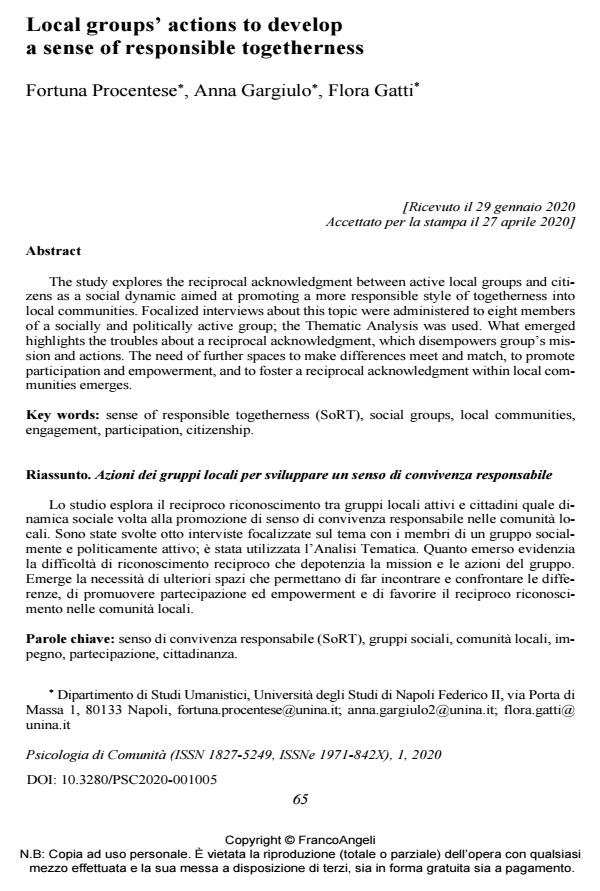Local groups’ actions to develop a sense of responsible togetherness
Titolo Rivista PSICOLOGIA DI COMUNITA’
Autori/Curatori Fortuna Procentese, Anna Gargiulo, Flora Gatti
Anno di pubblicazione 2020 Fascicolo 2020/1
Lingua Inglese Numero pagine 15 P. 65-79 Dimensione file 522 KB
DOI 10.3280/PSC2020-001005
Il DOI è il codice a barre della proprietà intellettuale: per saperne di più
clicca qui
Qui sotto puoi vedere in anteprima la prima pagina di questo articolo.
Se questo articolo ti interessa, lo puoi acquistare (e scaricare in formato pdf) seguendo le facili indicazioni per acquistare il download credit. Acquista Download Credits per scaricare questo Articolo in formato PDF

FrancoAngeli è membro della Publishers International Linking Association, Inc (PILA), associazione indipendente e non profit per facilitare (attraverso i servizi tecnologici implementati da CrossRef.org) l’accesso degli studiosi ai contenuti digitali nelle pubblicazioni professionali e scientifiche.
The study explores the reciprocal acknowledgment between active local groups and citi-zens as a social dynamic aimed at promoting a more responsible style of togetherness into lo-cal communities. Focalized interviews about this topic were administered to eight members of a socially and politically active group; the Thematic Analysis was used. What emerged high-lights the troubles about a reciprocal acknowledgment, which disempowers group’s mission and actions. The need of further spaces to make differences meet and match, to promote partic-ipation and empowerment, and to foster a reciprocal acknowledgment within local communi-ties emerges. .
Lo studio esplora il reciproco riconoscimento tra gruppi locali attivi e cittadini quale dina-mica sociale volta alla promozione di senso di convivenza responsabile nelle comunità locali. Sono state svolte otto interviste focalizzate sul tema con i membri di un gruppo socialmente e politicamente attivo; è stata utilizzata l’Analisi Tematica. Quanto emerso evidenzia la difficoltà di riconoscimento reciproco che depotenzia la mission e le azioni del gruppo. Emerge la neces-sità di ulteriori spazi che permettano di far incontrare e confrontare le differenze, di promuove-re partecipazione ed empowerment e di favorire il reciproco riconoscimento nelle comunità lo-cali.
Parole chiave:Senso di convivenza responsabile (SoRT), gruppi sociali, comunità locali, im-pegno, partecipazione, cittadinanza.
- Local Community Experience as an Anchor Sustaining Reorientation Processes during COVID-19 Pandemic Flora Gatti, Fortuna Procentese, in Sustainability /2021 pp.4385
DOI: 10.3390/su13084385 - Social Participation and Contemporary Scenarios: Transformations, Representations, and Psychosocial Impacts in Territories Fortuna Procentese, in PSICOLOGIA DI COMUNITA' 2/2026 pp.7
DOI: 10.3280/psc2025oa21758 - Valorizing Community Identity and Social Places to Implement Participatory Processes in San Giovanni a Teduccio (Naples, Italy) Fortuna Procentese, Flora Gatti, in Sustainability /2023 pp.14216
DOI: 10.3390/su151914216 - Sense of responsible togetherness, sense of community, and civic engagement behaviours: Disentangling an active and engaged citizenship Fortuna Procentese, Flora Gatti, in Journal of Community & Applied Social Psychology /2022 pp.186
DOI: 10.1002/casp.2566 - Academic Community in the Face of Emergency Situations: Sense of Responsible Togetherness and Sense of Belonging as Protective Factors against Academic Stress during COVID-19 Outbreak Fortuna Procentese, Vincenza Capone, Daniela Caso, Anna Donizzetti, Flora Gatti, in Sustainability /2020 pp.9718
DOI: 10.3390/su12229718 - Latin American University Students and Global Citizenship Francisca Koppmann, pp.109 (ISBN:978-3-032-03056-6)
- Presentazione del numero. Empowerment and social inclusion Immacolata Di Napoli, Sara Alfieri, in PSICOLOGIA DI COMUNITA' 1/2020 pp.5
DOI: 10.3280/PSC2020-001001
Fortuna Procentese, Anna Gargiulo, Flora Gatti, Local groups’ actions to develop a sense of responsible togetherness in "PSICOLOGIA DI COMUNITA’" 1/2020, pp 65-79, DOI: 10.3280/PSC2020-001005